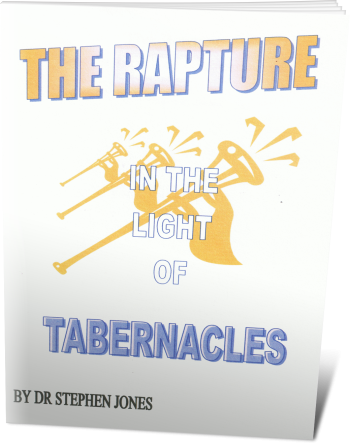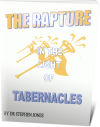Latest Posts
View the latest posts in an easy-to-read list format, with filtering options.

The resurrection is the fulfillment of the Feast of Trumpets, and the "catching away" of the saints is the fulfillment of the Feast of Tabernacles. Since most teaching on the "Rapture" does not take the Biblical feast days into account, this is a very valuable and different study.
Category - General

The divine law reveals His plan in both the first and second comings of Christ. The feasts in the seventh month of the Hebrew year (Sept.-Oct.) reveal the order of events in Christ's second coming. It begins with the resurrection at the Feast of Trumpets, repentance of the Church on the Day of Atonement, and the glory of God appearing in the Feast of Tabernacles.
On the first day of Tabernacles, the saints must receive their tabernacles from above which are immortal. It then requires seven full days of cleansing before they may be presented to the Father in the temple in heaven on the eighth day of Tabernacles, that last great day of the feast (John 7:37).
Being given an immortal body falls also under the lawful category of being "reborn." And so, the law of the presentation of the firstborn applies here, as written in Exodus 22:29 and 30,
{Exodus 22:29} 29 You shall not delay the offering from your harvest and your vintage. The first-born of your sons you shall give to Me. {Exodus 22:30} 30 You shall do the same with your oxen and with your sheep. It shall be with its mother seven days; on the eighth day you shall give it to Me.
In regard to sons, this is also the day of circumcision. Under the Old Covenant, the sons were physically circumcised; under the New Covenant, their hearts are circumcised. The first is a physical sign of what God requires; the second is what God actually requires as a prerequisite to the presentation of the Sons of God.
The Feast of Tabernacles is eight days long in order to allow the Sons of God to be reborn and to come to the appointed time of circumcision and presentation in the Temple in heaven. The law requires no more or less than eight days. The law says that the Sons of God cannot be presented to the Father on any other day but the eighth day—and in this case it must be the eighth of Tabernacles, the last great day of the feast.
There is another law applicable to this as well. Those overcomers who are raised from the dead and those overcomers who are alive at that end of the age will join forces to rule and reign with Christ in the Tabernacles Age to come. Rev. 20:6 says that "they will be priests of God and of Christ."
It is no surprise, then, that in the law of priesthood, it takes a full seven days to consecrate a priest, and then they emerge for ministry on the eighth day, at which time the glory of God is manifested. See the pattern in Lev. 8 and 9. Aaron and his sons were to go into the tabernacle and remain there for a full seven days (Lev. 8:33). Then they were called out on the eighth day (Lev. 9:1). The purpose of their being called out of the tabernacle is given in Lev. 9:4, "for today the Lord shall appear to you."
The Hebrew word translated "appear" is ra'ah, which means to see or be seen. And so the verse prophesies of the manifestation of the sons of God, where the glory of God is seen in them, manifested to the rest of the people. And, indeed, the glory did manifest at that time, for the fire of God came out from before His face [Heb. paniym] and consumed the offering by fire (Lev. 9:24). And the people fell on their faces [paniym].
This prophesies of the priestly ministry that is to come through the Melchizedek priesthood. It will begin on the eighth day of Tabernacles after the Sons of God have been fully consecrated and have received the circumcision of the heart, and after they have been presented to the Father and dedicated to Him.
Their ministry will be for a thousand years in the great Sabbath Millennium which I call the Tabernacles Age. Under their ministry, the Stone Kingdom of Daniel 2:35 will then grow until it fills the whole earth. The glory of God, as manifested on the eighth of Tabernacles, will begin to spread and cover the earth as the waters cover the sea, as God vowed to do in Num. 14:21.
These overcomers will have physical bodies—when they decide to do so—but will not be limited to the earth as our current, mortal bodies require. They will have bodies like Jesus after His resurrection, which are "flesh and bone" (Luke 24:39), but they will also be able to divest themselves of this fleshly clothing and return to heaven to minister to the Father in spiritual clothing.
This is pictured in Ezekiel 44 in the prophecy of the Zadok priests, who were types of the Melchizedek priesthood. Ezekiel says that they will have access to the Sanctuary to minister to God, while the other priests will have access only to the people in the "outer court" (i.e., the mortal body realm). Of this Melchizedek Order, we read in Ez. 44:17,
{Ezekiel 44:17} 17 And it shall be that when they enter at the gates of the inner court, they shall be clothed with LINEN garments; and WOOL shall not be on them while they are ministering in the gates of the inner court and the house.
These linens are the immortal garments that Paul mentions in 2 Cor. 5:1-4. They are a requirement to minister to God Himself in the inner part of the Sanctuary. But these priests will not be limited to the inner court, for we read in Ez. 44:19,
{Ezekiel 44:19} 19 And when they go out into the outer court, even the outer court of the people, they shall put off their [linen] garments in which they have been ministering and lay them in the holy chambers; then they shall put on other [wool] garments that they may not transmit holiness to the people with their [linen] garments.
We see from this that these priests will be able to minister in both the inner and the outer court. The only requirement is that they change garments when they do so. They must be clothed in spiritual garments when they minister to God; and they must be clothed in physical garments when they minister to the people in the outer court.
This is what Jesus did after His resurrection. The disciples were meeting with the doors locked, and suddenly Jesus appeared in their midst. They thought He was a spirit (Luke 24:37), but He disproved this assumption by showing them His hands and feet and by eating with them (vs. 41).
Then later He disappeared again. What happened? He simply changed clothing and became spirit again. Whenever He appeared on earth, He had to put on "woolen garments" in order that He would look like the sheep of His pasture. This was a lawful requirement in Ezekiel 44. Likewise, it was a lawful requirement that He minister to God in the inner sanctuary dressed in linens, not woolens.
Like the priests of old, He had access to the linen garments in the "holy chambers." Not only did the High Priest have such access to those garments, but also the priests ministering with Him had access to them. So it will be with Christ and the Sons of God.
The other priests, however, as prophesied in Ez. 44:10-14, will be appointed to minister to the people, but will not have access to the linen garments to minister to the Father directly. Of course, keep in mind that the only reason these priests will have any ministry at all is because they repented during the Days of Awe and the Day of Atonement. These are the "foolish virgins" (Matt. 25:2), the oppressive servants (Luke 12:45), and the miracle workers who said "Lord, Lord" but Jesus did not know (Matt. 7:22).
In Ezekiel 44 they are identified as priests who taught Israel to worship idols (of the heart). They are typified by the priesthood of Eli, who was replaced by Zadok in the days of Solomon (1 Kings 2:27, 35). This is the contrast in Ezekiel 44: Eli vs. Zadok, who are types of the two kinds of priests at the end of the age.
Learn of this difference, and you will know much about qualifying for the Melchizedek priesthood and what it takes to rule and reign with Christ in the age to come.